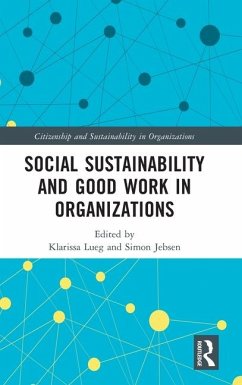This edited research monograph collects nine unique research contributions on the concept of social sustainability and its connection to possibilities and hindrances for good work in organisations. Social sustainability, in organisational contexts, emphasizes the long-term well-being of stakeholders and communities. The authors in this book demonstrate how organisational long-term strategies should prioritise employee well-being, mental health, community engagement, and ethical supply chain management, inter alia. Readers, from undergraduate students to the research community, will learn how long-term social sustainability orientation is different from Corporate Social Responsibility, which responds to immediate stakeholder expectations. The United Nations' Sustainable Development Goals have nudged many organisations to implement social sustainability, and many authors in this book relate to UN concepts such as the SDGs or Global Compact's definition of social sustainability.However, many organisations have come under scrutiny for acting merely ceremonial to live up to the current megatrends. In consequence, readers will take away that the line between genuine corporate mission and ceremonial lip services must be critically observed, and how this can be done in different areas. Key chapters of this book explore social sustainability, e.g., in higher education (as sustainable knowledge in business students), in corporate communication (employee identification, corporate volunteering, and corporate heritage), and in sustainable human resource management practices. Workplace toxicity, especially towards minorities, is explored, highlighting both the role of bystanders, and the financial repercussions of ignoring workplace harassment. Digital transformation's social implications, employee well-being, and the importance of psychological safety in startups are addressed. The chapters, all together, signify the relevance of meaningful work for long-term societal cohesion and individual fulfilment.
Bitte wählen Sie Ihr Anliegen aus.
Rechnungen
Retourenschein anfordern
Bestellstatus
Storno









